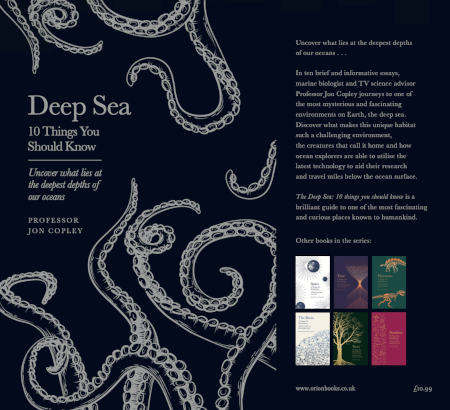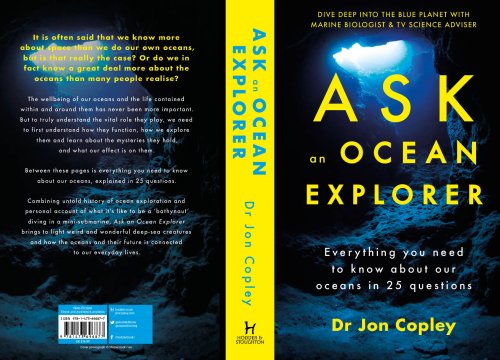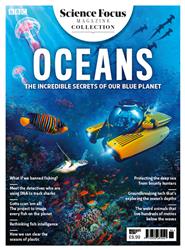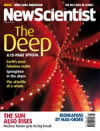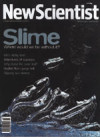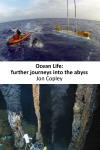What I write
I write popular-science articles about marine biology & oceanography, the history of ocean exploration, undersea technology, and "other stuff" (e.g. zoology, environmental microbiology, Earth science).
I was a Reporter and Assistant News Editor at New Scientist magazine, and I've written more than a hundred bylined articles for publications such as New Scientist, The Guardian, Nature, and BBC Science Focus. I'm the author of the popular-science books Deep Sea: 10 Things You Should Know (Orion Books, 2023) and Ask an Ocean Explorer (Hodder & Stoughton, 2019).
Please see below for a few extracts that give a flavour of what I write about, or explore the links to some of my favourite articles. For research papers that I've published as a scientist, please see Publications.
Books
Author of Deep Sea: 10 Things You Should Know (2023)
(published by Orion Books / Seven Dials):
Excerpt published by LiveScience:
Audiobook version:
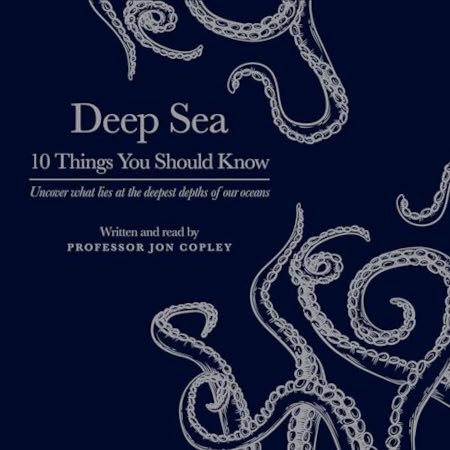
Audiobook extract, read by the author
Reviews:
- Times Literary Supplement review (15 Mar 2024):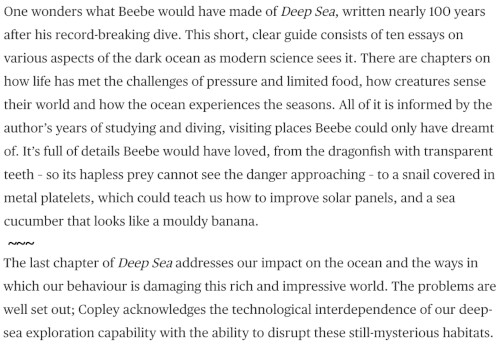

Also available in French, Dutch, simplified Chinese (and coming soon in Thai)
Author of Ask an Ocean Explorer (2019)
(published by Hodder & Stoughton):
Reviews:
- Nature review (21 Feb 2019, vol 566, p 325):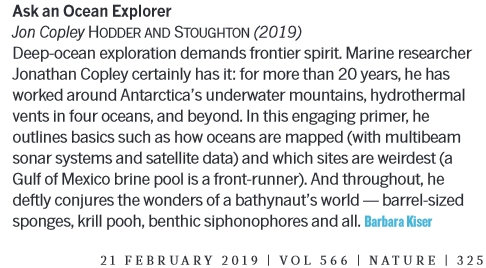
- Daily Express review (11 Mar 2019, p 23):
- Daily Mail review (29 Mar 2019, pp 58-59):
- Coast magazine 'Book of the Month', May 2019 (p 12):
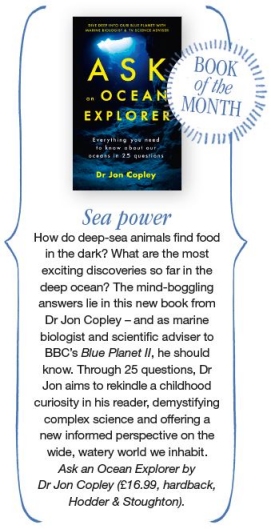
Diarist for Science,
not Art: Ten scientists' diaries (2003)
(pp 72-85; edited by Jon Turney, published by the Calouste Gulbenkian Foundation; ISBN 0903319985):

Reviews:
- Nature review (30 Oct 2003, vol 425, pp 902-903):
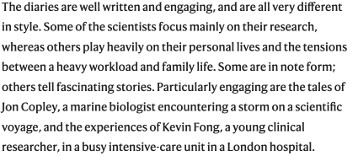
A few favourites
“It has always been our ambition to get inside that white space, and now we are there the space can no longer be blank,” wrote the polar explorer Captain Scott, on crossing the 80th parallel of the Antarctic continent for the first time in 1902. Fast-forward more than a century and the deep ocean floor around Antarctica still offers a “white space”, beyond the reach of scuba divers, only partially mapped in detail by sonar from ships and seldom surveyed by robotic vehicles...[more]
When politics met science: harmony or hegemony?
Scientists, Winston Churchill once opined, should be on tap but not on top. While that comment might set some teeth on edge, it acknowledges that scientific evidence is one of many considerations in policy and government, and does not necessarily have supremacy over other matters.
But science intersects many, if not all, problems tackled by policy-makers and governments. So how well served is the UK parliament by science in its role of scrutinising proposed legislation? And from my selfish perspective as a scientist, how well served is science by parliament? To find out, I spent a week in Westminster, as part of the Royal Society's annual parliamentary pairing scheme... [more]
Just how little do we know about the ocean floor?
[more] ...Philosophically, when it comes to exploring anywhere on our dynamic world, how and when do we decide that somewhere has "been explored"? Do we declare "mission accomplished" once we've seen a location for the first time? The local woods where I walk my dog look very different in winter compared with summer, with different species flourishing at different times. Should I have considered them "explored" after my first visit in just one season? Exploring our world starts with mapping, but perhaps doesn't really have an end.
Five thousand metres under the sea: my journey to another world
[more] ...The motives that spur our further journeys into the deep ocean will define its future. We can go there to learn from it, or to exploit its natural resources for our rapidly expanding population. Or perhaps for once we might achieve a balance between the two. The challenge of the deep ocean is no longer technological; now it is a test of whether our wisdom can match our ingenuity.
Litter found in deepsea survey of one of Earth's final unexplored realms
...Human-generated rubbish unfortunately has a long history in the deep ocean. In the age of steamships, for example, vessels dumped the remains of burned coal, known as clinker, from their engine rooms. Clinker changed the nature of the seafloor in well-travelled areas, transforming the seabed from soft sediment in which some forms of marine life can burrow, into cobbled areas suiting other life-forms that can anchor to hard surfaces. The scale of that transformation is such that clinker is now recognised as a seafloor type when we are mapping the deep ocean... [more]
Lonely whale's song remains a mystery
A lone whale with a voice unlike any other has been wandering the Pacific for the past 12 years.
Marine biologist Mary Ann Daher of Woods Hole Oceanographic Institution in Massachusetts, US, and her colleagues used signals recorded by the US navy's submarine-tracking hydrophones to trace the movements of whales in the north Pacific.
The partially declassified records show that a lone whale singing at around 52 hertz has cruised the ocean every autumn and winter since 1992. Its calls do not match those of any known species, although they are clearly those of a baleen whale, a group that includes blue, fin and humpback whales.
Blue whales typically call at frequencies between 15 and 20 hertz. They use some higher frequencies, but not 52 hertz, Daher says. Fin whales make pulsed sounds at around 20 hertz, while humpbacks sing at much higher frequencies. The tracks of the lone whale do not match the migration patterns of any other species, either.
Over the years the calls have deepened slightly, perhaps because the whale has aged, but its voice is still recognisable. Daher doubts that the whale belongs to a new species, although no similar call has been found anywhere else... [more]
- This was the first media coverage of the "52-hertz whale", aka "the loneliest whale", which has since captured popular imagination, from inspiring music to appearing in kids' TV cartoon The Octonauts; I'm therefore proud to claim breaking the story in the press.
Beach blob mystery solved at last
"An ocean without unnamed monsters," wrote John Steinbeck, "would be like sleep without dreams." But the dream that a new species of sea monster washed up in Chile in 2003 is over. Marine biologists have definitively shown that the "Chilean Blob" and other similar mysteries are simply the remains of whales... [more]
The ocean floor is being covered with remote-controlled observatories, letting oceanographers keep tabs on the sea without getting wet. Jon Copley investigates.
The ocean floor is an exciting place to visit, but you might not want to live there. Fortunately, those who want to keep an eye on what goes on beneath the waves now have an alternative. Instead of trying to colonize the sea floor, marine scientists are planning networks of unstaffed seafloor observatories across the globe. Connected by fibre-optic cables or linked to satellite buoys, this wet-world-web will let oceanographers make long-term measurements and run experiments in the depths without leaving their desks.
Back in the 1960s it seemed we were on the verge of living under the sea, gadding about in submersibles while pet porpoises fetched the morning papers. To show that people could live underwater, Jacques Cousteau famously developed the Conshelf habitats of basic undersea homes that could accommodate several people at depths of 10 to 100 metres, complete with a garage for a diving saucer. The US Navy SEALAB experiments, which actually used a porpoise to deliver mail from the surface, explored the limits of undersea living further. But the dream of colonizing the continental shelf proved costly and dangerous... [more]
Sea level study reveals Atlantis candidate
It sounds a familiar enough yarn - a lone researcher claiming to have pinpointed the lost land of Atlantis famously described by Plato. But this time there is no mention of "supercivilisations", UFOs or magic crystals. Instead, he has turned the clock back on ancient rises in sea level to reveal an island that matches Plato's story... [more]
Lurking in the oceans are creatures that can create balls of plasma almost as hot as the surface of the Sun, a Dutch researcher has found... [more]
"Master of survival. Can withstand pressures six times greater than those at the bottom of the ocean and endure temperatures ranging from more than 100 °C down to absolute zero. Can shrug off lethal radiation, survive in a vacuum and go without water for more than a century."
It sounds like the résumé of a superhero. But these traits belong to little-known animals less than a millimetre long that probably live on your rooftop... [more]

Relativity and quantum mechanics will be remembered as two great milestones of twentieth century science. What keeps me awake at night, however, is wondering what shrimps are doing when I'm not looking at them. This concern may actually have more in common with relativity and quantum mechanics than one might think... [more]
- Winner of the New Scientist / Wellcome Trust Millennial Essay Competition 1997

...Most of the species found at the hot springs are new to science, and the expedition collected a large assortment of tubeworms, snails, sea spiders and clams. Extracts from these animals will be put through tests by Dr Mark Hamann at the University of Mississippi to look for compounds with anti-viral, anti-bacterial and anti-tumour properties that could be synthesised to produce new drugs...
- Where science writing began for me: 2nd Prize in The Daily Telegraph Young Science Writer Awards 1996




